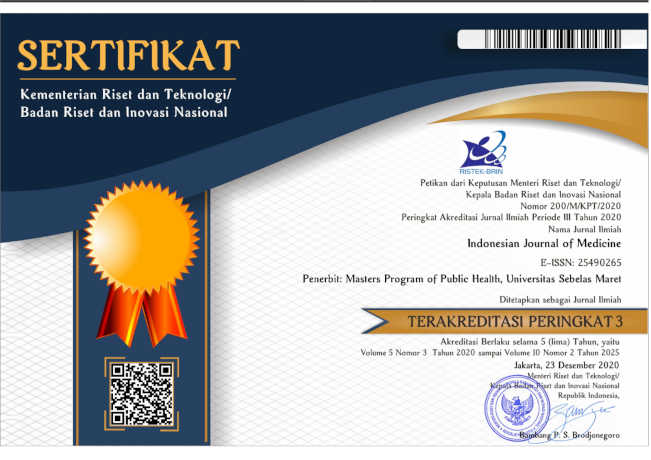Meta-Analysis of the Effect of Cognitive Activity Exercise on Independence Ability in Post-Stroke Patients
DOI:
https://doi.org/10.26911/theijmed.2022.7.3.587Abstract
Background: A stroke is an attack on the brain that occurs when the blood supply to part of the brain is blocked so that part of the brain becomes damaged and dies because it does not get nutritional intake. Cognitive exercise activities can maintain optimal blood flow and improve the delivery of nutrients to the brain. The study aims to analyze the effect of cognitive exercise activity on the independence ability in post-stroke patients.
Subject and Method: The study was a meta-analysis with PICO as the following: Population: post-stroke patients. Intervention: cognitive exercise activity. Comparison: no cognitive exercise activity. Result: independence ability. The articles used in this study were obtained from three databases, namely Google Scholar, PubMed, and ScienceDirect. The keywords for searching for the articles were "cognitive exercise activity" AND "cognitive ability" AND "post-stroke". The included articles were full-text English versions with a randomized control trial study design from 2012 to 2022. The article selection was conducted using the PRISMA flow diagram. The articles were analyzed using the Review Manager 5.3 application.
Results: A total of 9 case studies from Europe (Oxford, Sweden, United Kingdom), South America (Brazil), North America (Texas, Jamaica), Asia (Korea), and Africa (Egypt) were selected for systematic review and meta-analysis. It was discovered that cognitive exercise activity of 0.36 units increased independence ability in post-stroke patients compared to not obtaining cognitive exercise activities. Result statistically (SMD = 0.36; 95% CI = 0.19 to 0.54; p<0.001).
Conclusion: Cognitive exercise activity increased independence ability in post-stroke patients
Keywords: cognitive exercise activity, cognitive ability, post-stroke.
Correspondence: Lukman Aktovianta. Masters Program in Public Health, Universitas Sebelas Maret. Jl. Ir. Sutami 36A, Surakarta 57126, Central Java, Indonesia. Email: lukman.aktovianta15@gmail.com. Mobile: +6285641434548.
Indonesian Journal of Medicine (2022), 07(03): 350-359
https://doi.org/10.26911/theijmed.2022.07.03.12
References
Aguiar LT, Nadeau S, Britto RR, Teixeira Salmela LF, Martins JC, Samora GAR, Da Silva JJA, et al., (2020). Effects Of Aerobic Training On Physical Activity In People With Stroke: A Randomized Controlled Trial. Neur. Rehabil. 46(3): 391–401. DOI: 10.3233 /NRE193013.
ElTamawy MS, AbdAllah F, Ahmed SM, Darwish MH, Khalifa HA (2014). Aerobic Exercises Enhance Cognitive Functions And Brain Derived Neurotro phic Factor In Ischemic Stroke Patients. Neur. Rehabil. 34(1): 209–213. DOI: 10.3233/NRE131020.
Gordon CD, Wilks R, McCawBinns A. (2013). Effect Of Aerobic Exercise (Walking) Training On Functional Status And HealthRelated Quality Of Life In Chronic Stroke Survivors: A Randomized Controlled Trial. Stroke. 44(4): 1179–1181. DOI: 10.1161/STROKEA HA.111.00 0642.
Gunnes M, Indredavik B, Langhammer B, Lydersen S, IhleHansen H, Dahl A E, Askim T (2019). Associations Between Adherence to the Physical Activity and Exercise Program Applied in the LAST Study and Functional Recovery After Stroke. Arch Phys Med Rehabil. 100(12): 2251–2259. DOI: 10.1016/ j.apmr.2019. 04.023.
Kim J, Yim J (2017). Effects Of An Exercise Protocol For Improving Handgrip Strength And Walking Speed On Cognitive Function In Patients With Chronic Stroke. Med. Sci. Monit. 23: 5402–5409. DOI: 10.12659/MSM.904723.
Kramer SF, Hung SH, Brodtmann A (2019). The Impact of Physical Activity Before and After Stroke on Stroke Risk and Recovery: a Narrative Review. Curr Neurol Neurosci Rep. 19(6). DOI: 10.1007/s1191001909494.
Kuriakose D, Xiao Z (2020). Pathophysiology And Treatment Of Stroke: Present Status And Future Perspectives. Int. J. Mol. Sci. 21(20): 1–24. DOI: 10.3390/ ijms2120 7609.
Meester D, Yahya E Al, Dennis A, Collett J, Wade DT (2018). A Randomised Controlled Trial Of A Walking Training With Simultaneous Cognitive Demand (Dual Task) In Chronic Stroke. 3500: 1–10.
Moore SA, Hallsworth K, Jakovljevic DG, Blamire AM, He J, Ford GA, Rochester L, et al. (2015). Effects of Community Exercise Therapy on Metabolic, Brain, Physical, and Cognitive Function Following Stroke: A Randomized Controlled Pilot Trial. Neuro rehabil. Neural Repair. 29(7): 623–635. DOI: 10.1177/15459 6831456 2116.
Murti B. (2018). Prinsip dan Metode Riset Epidemiologi (5th ed.). Program Studi Ilmu Kesehatan Masyarakat, Program Pascasarjana, Universitas Sebelas Maret.
Muzamil MS, Afriwardi A, Martini RD (2014). Hubungan Antara Tingkat Aktivitas Fisik dengan Fungsi Kognitif pada Usila di Kelurahan Jati Kecamatan Padang Timur. J. kesehat. Andalas. 3(2): 2012–2015. DOI: 10.25077/jka.v3i2.87.
Swank C, Trammell M, Callender L, Bennett M, Patterson K, Gillespie J, Kapoor P, et al. (2020). The Impact Of A PatientDirected Activity Program On Functional Outcomes And Activity Participation After Stroke During Inpatient Rehabilitation A Randomized Controlled Trial. Clinical Rehabilitation. 34(4): 504–514. DOI: 10.1177/02692155 19901153.
Vahlberg B, Cederholm T, Lindmark B, Zetterberg L, Hellström K (2017). ShortTerm And LongTerm Effects Of A Progressive Resistance And Balance Exercise Program In Individuals With Chronic Stroke: A Randomized Controlled Trial. Disabil. Rehabil. 39(16): 1615–1622. DOI: 10.1080/09638 288.2016. 1206631.
Vahlberg B, Lundström E, Eriksson S, Holmbäck U, Cederholm T (2021). Effects On Walking Performance And Lower Body Strength By Short Message Service Guided Training After Stroke Or Transient Ischemic Attack (The STROKEWALK Study): A Randomized Controlled Trial. Clin Rehabil. 35(2): 276–287. DOI: 10.1177/0269215520954346.











